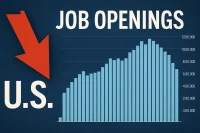Fintech giant Block is to cut a further 1,000 jobs in another large-scale reorganization.
The company, which was co-founded by Twitter creator Jack Dorsey, will also reassign 200 managers into non-management roles.
800 job openings will also be closed.
These moves come just over a year after a similar restructuring that saw around 1,000 employees laid off.
Dorsey’s message to the team emphasized that these cuts are not driven by the goal of reducing headcount or introducing AI-driven layoffs. Instead, he framed the changes as necessary to boost performance and streamline the company’s operations.
Block operates several well-known platforms, including Square, Afterpay, CashApp, and Tidal.
Despite its broad portfolio, the company’s stock has dropped by 29% this year, leading to concerns over its growth and profitability. As Dorsey takes on more operating control, the company’s revenue and profits have stagnated, fueling the push for organizational change.

Why This Restructuring Matters for Employees
The news of these layoffs may feel unsettling, but it also sheds light on larger trends within the tech industry and beyond.
Block’s decision to reorganize is not unique; many companies are rethinking their staffing models to become more agile and efficient.
How Employees Can Adapt
For job seekers and current employees in similar sectors, understanding the underlying reasons behind these layoffs can offer valuable insights into how to prepare for potential job disruptions.
In Block’s case, Dorsey emphasized the need for the company to “move faster” and “act like a startup again.”
This points to a broader trend in the tech industry where companies are increasingly focused on efficiency, performance, and agility over sheer headcount.
- What job seekers should know: Companies like Block are looking for top-tier talent that can deliver fast results and adapt to change quickly. Those with a strong ability to innovate, problem-solve, and remain flexible are more likely to thrive.
- For current employees: Block’s reorganization underscores the importance of continually assessing personal performance. Employees should consider how they can contribute more directly to company goals and showcase their ability to execute swiftly.
Understanding the Bigger Picture: Industry Trends
The trend toward layoffs and restructuring is not isolated to Block.
In fact, it reflects a larger movement across the tech and financial sectors.
Companies are rethinking their organizational structures, looking to optimize resources and increase speed to market. As industries evolve, it is becoming clear that organizations are focusing on results over headcount.
What’s Behind These Changes?
- Performance Focus: Dorsey’s email highlighted the goal of “raising the bar and acting faster.” For companies like Block, this means reducing organizational layers and empowering teams to move more quickly. This focus on agility is critical in fast-paced industries, where speed and adaptability are key to staying ahead of competitors.
- Flattening the Organization: By cutting layers of management and streamlining operations, companies hope to increase efficiency and reduce bureaucracy. This “flattening” of the organizational structure allows for quicker decision-making and greater responsibility for employees at all levels.
- Innovation as a Competitive Edge: Block’s restructuring could also signal a broader need for innovation. Dorsey’s desire to “stay ahead of the transformational moment our industry is in” points to the accelerating pace of change in fintech and tech as a whole. This transformation requires companies to adapt quickly and often without warning.
What Does This Mean for Employers?
For employers in any sector, the question becomes: how can they use Block’s restructuring as a model to refine their own operations? The focus on speed, innovation, and efficiency is a key takeaway.
- Prioritize agility: For businesses seeking to remain competitive, it’s essential to evaluate how their organizations can become more nimble. Flattening hierarchies and investing in high-performance teams may be critical steps to improving overall effectiveness.
- Invest in employee growth: Employers should recognize that the emphasis on faster execution may require upskilling and reskilling existing teams. Companies may need to invest more in training their workforce to stay ahead of technological advancements and shifting market demands.
- Transparency and Communication: Dorsey’s decision to communicate the restructuring clearly and directly shows the importance of transparency. Employers can learn from this approach by keeping their teams informed and involved in organizational changes, fostering trust during uncertain times.
The Future of Work in Tech: What’s Next?
Block’s latest moves reflect the growing emphasis on efficiency and high performance in the tech world. As companies continue to refine their operations, it’s likely that more businesses will adopt similar restructuring strategies.
The increasing integration of AI, automation, and digital tools could also be factors driving these changes, as companies strive to remain at the forefront of innovation.
For employees, especially those in technology and fintech, the key takeaway is the need for adaptability.
Companies will increasingly look for individuals who can contribute meaningfully to fast-paced environments.
Likewise, job seekers should focus on honing skills that align with the evolving needs of the industry, such as data analysis, digital transformation, and innovation.
Takeaways for Job Seekers
- Be adaptable: Embrace new technologies and be prepared for rapid change.
- Focus on performance: Demonstrate the ability to execute and deliver results quickly.
- Stay informed: Understand industry trends and adjust your skill set accordingly.
Final Thoughts
As Block navigates these significant changes, it’s clear that the shift towards a more agile, performance-driven model is the future of many companies.
For employees and job seekers, this transformation signals the need to continuously evolve and align with the fast-paced demands of the industry.




